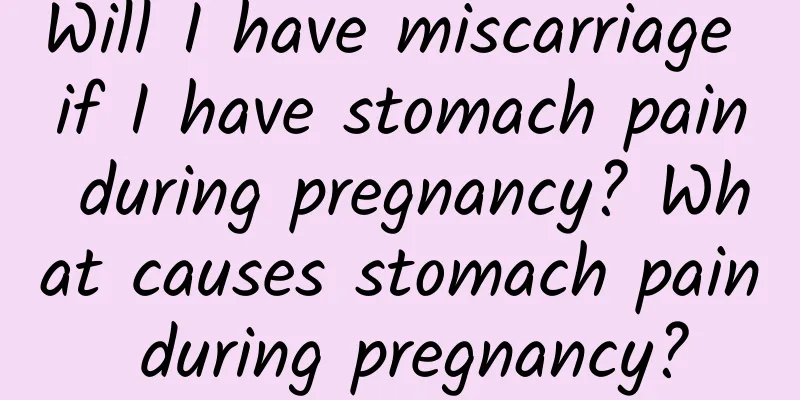Will I have miscarriage if I have stomach pain during pregnancy? What causes stomach pain during pregnancy?

|
Abdominal pain during pregnancy is a common problem for many mothers, but the causes of abdominal pain vary. Some are normal, while others are precursors to miscarriage. Therefore, expectant mothers must understand the causes of abdominal pain during pregnancy. This will not only help relieve the mother's worries, but also better prevent abdominal pain during pregnancy. So, will abdominal pain during pregnancy lead to miscarriage? So what are the causes of abdominal pain during pregnancy? 1. Physiological abdominal pain Many pregnant women will experience abdominal pain in the early stages of pregnancy. This is due to the enlargement of the uterus. During the development of the embryo, the uterus will gradually become larger and will constantly stimulate the lower end of the ribs. At this time, the pregnant woman will feel discomfort and abdominal pain, but this pain is often mild, so pregnant women do not need to worry too much. 2. Signs of threatened miscarriage or ectopic pregnancy If the abdominal pain comes in fits and starts, or there is continuous pain in the lower abdomen and a small amount of vaginal bleeding, it may be a sign of threatened abortion or ectopic pregnancy, and the pregnant mother needs to go to the hospital for treatment in time. 3. Causes of disease If the pregnant mother eats irritating food (such as spoiled food, cold food), she will experience intestinal cramps and lower abdominal pain. In addition, diseases such as acute gastritis, acute pancreatitis, gastroenteritis, and uterine fibroid degeneration can also cause pregnant women to feel abdominal pain. Therefore, if it is acute abdominal pain, pregnant mothers need to go to the hospital in time to avoid worsening of the disease or miscarriage. 4. Placental abruption It often occurs in the third trimester of pregnancy. The expectant mother may have pregnancy-induced hypertension, chronic hypertension, or abdominal trauma. Tearing pain in the lower abdomen is a typical symptom, often accompanied by vaginal bleeding. The degree of abdominal pain is affected by the size of the abruption area, the amount of blood, the internal pressure of the uterus, and whether the uterine muscle layer is damaged. In severe cases, the abdominal pain is unbearable, the abdomen becomes hard, the fetal movement disappears, and even shock occurs. Therefore, in the late pregnancy, pregnant women with high blood pressure or abdominal trauma should go to the hospital in time to prevent accidents. Five: hydatidiform mole The symptoms include more obvious pregnancy reactions after pregnancy, rapid abdominal enlargement, bloating and pain without fetal movement, irregular vaginal bleeding around 3 months of pregnancy, abdominal pain that may be mild or severe, and blister-like discharge. |
Recommend
How to treat dysmenorrhea
Among the many gynecological diseases of women, d...
How to calculate the time for abortion? In what situations is it not advisable to have an artificial abortion?
Abortion is a last resort after an unexpected pre...
How can women prevent amenorrhea?
How to prevent amenorrhea? I believe many women h...
What causes Trichomonas vaginitis?
What causes Trichomonas vaginitis? Trichomonas va...
What are the symptoms of female infertility? What causes female infertility?
Getting married and having children are always th...
What causes ovarian cysts?
Ovarian cysts are a gynecological disease that of...
How can women prevent vaginitis caused by mites?
Mites are parasites that are difficult to see wit...
What are the symptoms of cervicitis in women? How should women prevent cervicitis?
Cervicitis is a common gynecological disease for ...
How much does it cost to treat pelvic peritonitis?
This is a materialistic society. Our comfort and ...
6 major reasons for infertility caused by artificial abortion
Artificial abortion is a remedy that is taken as ...
Two aspects of TCM etiology of senile vaginitis
Senile vaginitis belongs to the category of "...
Let's take a look at the causes of vulvar leukoplakia
The cause of vulvar leukoplakia is a topic of gre...
Several main clinical symptoms of vulvar leukoplakia
Vulvar leukoplakia is a disease that is very harm...
What are the common harmful manifestations of uterine fibroids?
Among gynecological diseases, I believe most peop...
Do you know all this knowledge in the uterus pictures? You may not know this knowledge
Many people do not know much about endometrial th...









